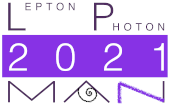Speaker
Description
Among the projects currently under study for the post-LHC generation of particle accelerators, the muon collider represents a unique machine, which has the capability to provide leptonic collisions at energies of several TeV and to open the path to a broad and mostly unexplored Physics programme. However, on the experimental side, such a great Physics potential is accompanied by unprecedented technological challenges, due to the fact that muons are unstable particles. Their decay products interact with the machine elements and produce an intense flux of background particles that eventually reach the detector and might degrade its performance. Being the closest detector to the beamline, the tracker is affected the most by the beam-induced background. This contribution will outline the measures adopted in order to mitigate the background effects on the track reconstruction and will present the tracking performance in the presence of the beam-induced background.
